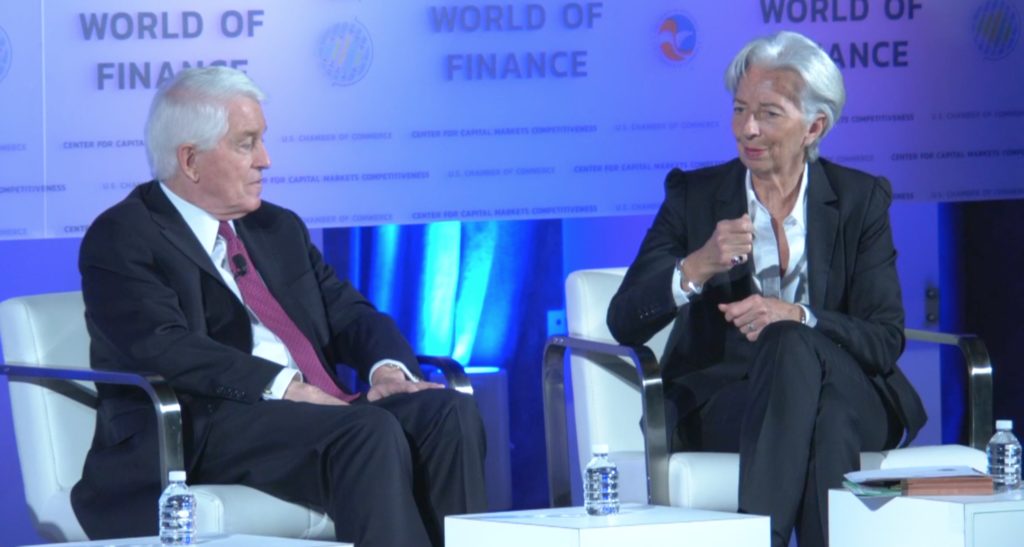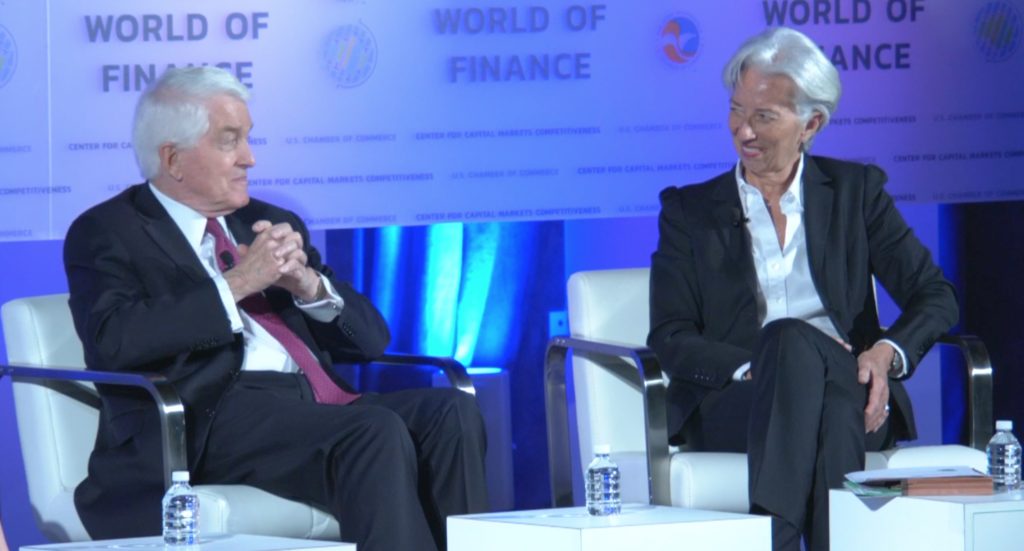
The most effective way to reduce a bilateral trade deficit is to steer clear of tariffs—because tariffs on the goods of one country only divert trade flows to other countries.”
Kemi Osukoya
April 2, 2019
Rising trade tensions, financial tightening and country-led precarious events, such as Brexit are leading to a slowdown in global economy, warns International Monetary Fund Managing Director Christine Lagarde.
Ms. Lagarde made the remarks Tuesday at an event at the U.S. Chamber of Commerce.
Speaking to business leaders, Ms. Lagarde said the IMF’s 3 ½ percent global growth forecast for 2019 and 2020 released in January “has since lost further momentum.” But she emphasized that the IMF does not see a recession in the near term. In fact, she said, the IMF expects to see some upswing in growth in the second half of this year and into 2020 due to monetary normalization by major central banks—led by the United States Federal Reserves—and from increased stimulus in China.
“These policy responses have supported an easing of financial conditions and increased capital flows to emerging markets, where currencies have strengthened relative to the U.S. dollar,” stated Ms. Lagarde.
However, she warned that extensive uncertainties such as high debt in a number of sectors and countries, tensions around trade policy, and an agitated financial markets, or should there be, for example, “a sharper-than-expected tightening of financial conditions,” could create serious challenges for many governments, especially low income countries and the private sector in terms of refinancing and debt service—which could amplify exchange rate movements and financial market corrections.

Financial analysts as well as U.S. Chamber of Commerce President Tom J. Donohue concurred with her views about the current financial and trade uncertainties, including the trade war with China.
“We have to look at the fundamental reality. From talking to economists and If you take the past seven or eight weeks, [you see that] all of a sudden a lot of people that have been putting money into markets and investing in new technologies are [now] holding on to their cash. They want to know what’s going to happen. They want to know what’s going to happen in Venezuela,” said Mr. Donohue, who was a co-panelist with Ms. Lagarde at an event at the U.S. Chamber of Commerce. “When you look at this issue, they are not about one country, you look at Venezuela, it’s got connection to Colombia by a bridge and it’s got millions of Venezuelans living [in Colombia] and you got 20 thousands plus hard nose Cuban troops in Venezuela, and the Russia who got $25 billions invested there and now want to start stashing their planes there and there’s the Chinese with $50 billion plus invested there too. When you go all around the world and look at these complex things that are much complex than you think, and investors are chickened. When things are unstable, and they are looking at it and wondering what is going to happen next week, which also means what is going on in our world on trade; they say, I think I’m going to do that next week or next month or why don’t we look at it at the next board meeting.”
He stressed that while these uncertainties call for prudence, they can also be great for the markets. “If you don’t have uncertainties, remember what happened to all the big banks— time of very low interest rates, very low growth—all of them that used to make tons of money on trade, they couldn’t make any and there was no movements so they shift their investments. Now, we are back on trade, I don’t think the market is an articulation of the health of the economy, It is recognition that there are people in this country [U.S] and around the world that are willing to take a risk on the health of this [global] economy.”
Ms. Lagarde added that this delicate financial time should be handled prudently to avoid policy mistakes as well as to make sure to take the right policy steps. Such policy steps will include countries reinforcing domestic policies to build a more resilient and inclusive economies, cross-border policies that will enable a more balance playing field and a multilateral partnership efforts among countries to address some of the major global challenges affecting the world at large— including corruption, migration, cyber security risks and the threat of climate change. She said these are issues that no country can solve alone and require public private partnership as well as innovation and technology to effectively tackle some of these issues.
Ms. Lagarde also stated that one of those challenges affecting countries, especially in emerging economies is the issue of corruption which she delineated as an “international plague” that costs the global economy an annual $1.5 trillion—roughly two percent of global GDP. She said “to fight it effectively requires international cooperation.”
“The annual cost of bribery alone is over 1.5 trillion dollars—roughly two percent of global GDP,” said Ms. Lagarde. “Our latest research underlines the high fiscal cost of corruption, leading to a massive loss in public revenue and lower-quality public spending. This new analysis confirms what we had all long suspected: corruption lowers growth. It increases inequality. It feeds distrust.”
She said the IMF is working with countries to address issues relating to money laundering and the financing of terrorism, which are other serious dimensions of the problem and has stepped up its focus on the macroeconomic effects on these nations.
She underscored that curbing corruption will require countries and governments to accept responsibility for what happens within their own borders and put in place the right policy measures and macroeconomic policy to secure growth and stability. She added that putting the right policy in place will not only “make a significant difference,” in fiscal revenues, which could be up to 4 percentage points of GDP between countries. More importantly, it will result in better governance, which is also associated with more efficient spending on vital infrastructure: from roads, to schools, to hospitals and improvement in socioeconomic benefits.
Ms. Lagarde also urged countries to avoid putting up trade barriers but to work collaboratively on cross-border policies and trade integration “to reduce trade barriers and modernize the global trade system—so that we all win.” Such efforts will including putting in place rules-based frameworks, including financial regulations, international corporate taxation, improving debt transparency, all of which will ensure fair competition, as well as create a level playing field for all by helping to increase prosperity, reduce poverty, spread new technologies, and boost productivity.
“The fact is that, historically, bilateral trade balances have been driven mostly by macroeconomic factors, not bilateral tariffs. In other words, the most effective way to reduce a bilateral trade deficit is to steer clear of tariffs—because tariffs on the goods of one country only divert trade flows to other countries,” Ms. Lagarde underscored. “Nobody wins a trade war—you might have heard me say that as well! That means addressing issues such as state subsidies, intellectual property, and data privacy. It also means new deals to unlock the full potential of tradeable services and digital commerce. And it means having rules-based frameworks to ensure fair competition and a level playing field.”
She added that, “as we move forward, we need collective action to modernize the key functions of the World Trade Organization: from negotiation, to transparency, to dispute resolution. This will create a stronger and more flexible system.”



